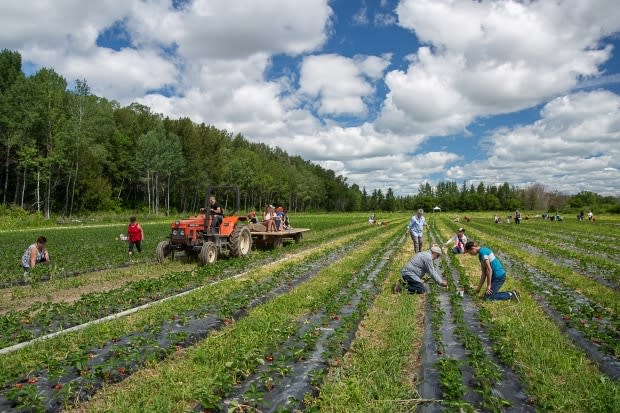Food security experts warn of supply shortages, higher prices due to global pandemic

Food security experts are warning the global pandemic could lead to supply shortages, higher prices and a growing nutrition gap between rich and poor.
Elaine Power, a food security expert at Queen's University, said the coronavirus pandemic is exposing "critical weaknesses" in various vital networks, including health care systems and food supply chains.
"The people who are already food insecure, that's only going to get worse. The type of resources that people would normally draw on probably aren't going to be there," she said.
Suddenly, hundreds of thousands more Canadians are at risk of going hungry, she said.
Power said various problems caused by the pandemic — border closures restricting the movement of foreign farm workers, transportation and import bottlenecks, panic hoarding at grocery stores — can all contribute "massively" to higher prices or food shortages.
Even the honeybees normally imported from other countries to pollinate Canadian crops could become harder to source, she said.
All of this potential for scarcity should give Canadians a wake-up call about food security — something they've always taken for granted, she said.
"The labour that goes into it, whether it's in the fields, or in the factories, in the grocery stores or in the home — It's not valued and it's mostly invisible," she said.
Power said price increases for some goods could lead to even greater nutritional disparities between low-income households and everyone else.
Earlier Friday, Prime Minister Justin Trudeau announced $100 million for food banks and breakfast clubs.
He said organizations that deliver food to the needy are struggling with growing demand while facing fewer donations and volunteers.
During his daily briefing in Ottawa, he said the work that groups like Food Banks Canada, the Salvation Army and Breakfast of Canada do is "essential," especially in Indigenous and northern communities.
Watch: Prime Minister Justin Trudeau says Food Banks will get $100 Million:
"We are grateful for the incredible, tireless work you do even in these extremely difficult circumstances — especially in these extremely difficult circumstances. You are doing essential work for our most vulnerable," he said.
"You are showing what it is to be Canadian, to be there for each other in times of difficulty."
Food Banks Canada, which will receive about half the money, said it's grateful for the funding as it sees "drastic reductions" in donations and a spike in demand.
"We are now working through the details of the announcement with our network of over 3,000 food banks and community agencies, and will provide further updates on how this money will be used to help build capacity and supports at the local level as we all continue to adapt to the effects of the coronavirus crisis," the organization said in a statement.
Food Banks Canada projects the demand in coming weeks will exceed what it saw during the 2008 recession, as a rise in company closures, layoffs and employment insurance (EI) claims has a trickle-down effect on food banks.
The federal government has said it received more than 1.6 million applications for EI in just over a week.
'Bigger band-aid'
Valerie Tarasuk, a nutritional sciences expert at the University of Toronto, said even before COVID-19 struck, about 4.4 million Canadians were living in food-insecure households. With the coronavirus outbreak, many more Canadians will be in that situation.
Tarasuk said today's announcement of $100 million funding for food banks is a "bigger band-aid" and that more systemic changes are needed to address food insecurity.
"It is one more frantic attempt to patch a social safety net that was not working well even before COVID-19," she said.
"Adding cash to a fragmented ... volunteer-run charity system that depends on face-to-face interactions and was only ever serving a small fraction of the people in need is completely misplaced. It isn't about how much money the feds give to food banks. The problem is that they are trying to address serious problems of material deprivation through ad hoc community charities."
Foreign worker challenge
Sylvain Charlebois, a food distribution and security expert at Dalhousie University, said the entire food system is affected by COVID-19, from individual households and local communities to global supply chains.
On the production front, he points to the pressing challenge of getting access to some 60,000 temporary foreign workers who normally come to Canada each year to help produce and harvest food products. A similar situation in the U.S. also puts at risk those products that are exported to Canada.

"The foreign worker issue is problematic for Canada (and) both sides of the border," he said. "That said, logistics remain functional across North America, as long as state and national borders remain open (for agricultural trade)."
The federal government confirmed in March that foreign workers will be allowed into the country despite the COVID-19 travel ban because they are considered essential workers.
But travel restrictions and a slowdown in bureaucracies in Canada and abroad have delayed the process.
Many employers are also weighing the higher costs of employing foreign workers, since they must also pay them during a mandatory 14-day quarantine period upon arrival.
Charlebois said the next few weeks are going to be critical, as the world sits on the brink of a "major slowdown in agrifood trades" and borders become more fragile.
"Uncertainty about the availability of food can literally trigger a wave of export restrictions, creating a shortage on world markets. Such a scenario is highly improbable, but not impossible," he said.

 Yahoo Movies
Yahoo Movies 
